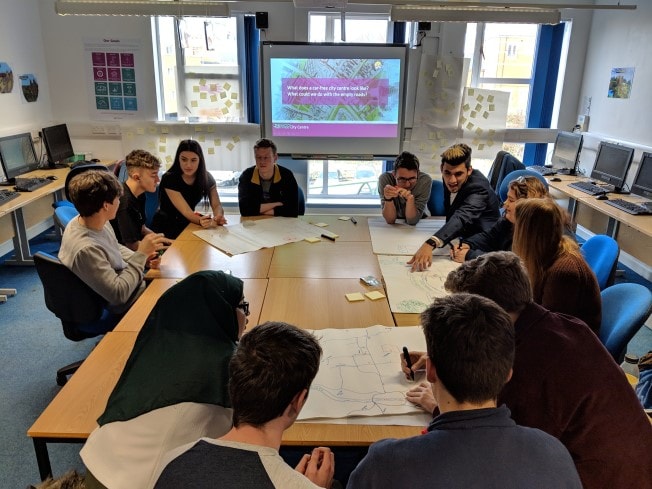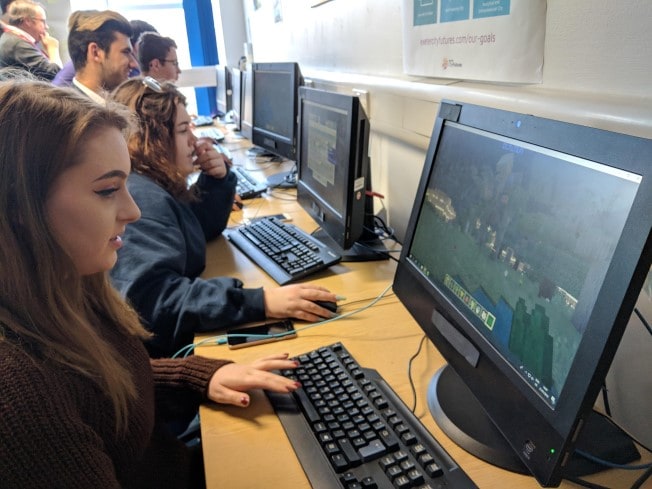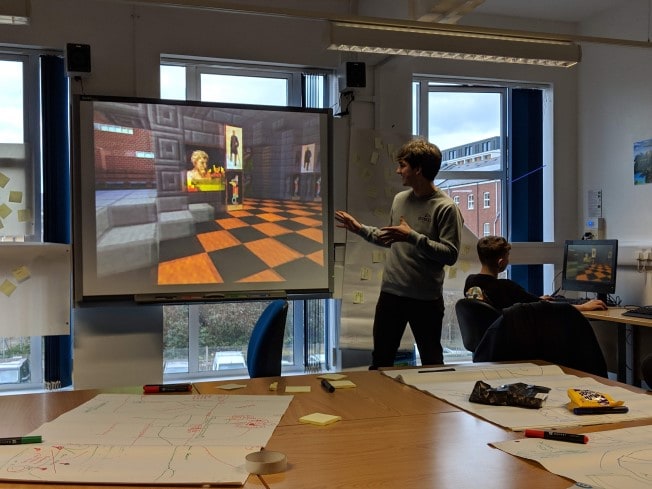Building a sustainable future with the Exeter 2025 Minecraft Challenge

Looking for ways to engage your students or community in imagining a more sustainable future? Here’s an idea: run a design challenge using Minecraft to spark ideas and encourage civic participation.
Students in Exeter, a vibrant city in the UK with unique Roman history, are invited to reimagine their city’s future in Minecraft for the Exeter 2025 Minecraft Challenge. This program launched in February 2019 with a series of workshops and citywide competition in which students use a downloadable Minecraft map to design a more sustainable city, addressing issues like renewable energy, public transit, traffic and bicycle infrastructure. The Exeter 2025 Minecraft Challenge is hosted by nonprofit Exeter City Futures in partnership with the Royal Albert Memorial Museum and Gallery and Exeter City Council.
This guest blog post was written by Mark Jones, Creative Director at Global City Futures.
The Exeter 2025 Minecraft Challenge is part of an innovation process which has been established to ensure that all citizens have a say in how Exeter develops, whether they’re city leaders or students. My role as Creative Lead for Global City Futures has allowed me to develop the challenge for Exeter City Futures, as a collaborative project which has brought together key educational and cultural partners in the City.
Starting with a Minecraft Map of Exeter, generated from Open Data using Geocraft, the challenge offers students and teachers a starting point for redesigning the city. Buildings, infrastructure and landscape are accurately recreated in Minecraft blocks at a 1:1 scale, allowing participants to rapidly prototype solutions to a series of five prompts – Car-free City Centre, Sustainable High Street, Super Cycle Paths, Alternative Energy Sources and Alternative Transportation.

To mark the launch of the Exeter 2025 Minecraft Challenge earlier this year, Exeter City Futures teamed up with the Royal Albert Memorial Museum & Art Gallery, Exeter College, Exeter City Council, and the Minecraft Education team to run a workshop where students worked in teams to craft solutions to one of the prompts.
We kicked off the workshop with an introduction to the challenge, journey through Exeter’s historic maps, introduction to Exeter’s historic Minecraft maps, and visualisations of a possible future Exeter from 1946. We set up the challenge prompt of a Car-free City Centre, and posed the students questions that would spark ideas and set no limits on their imagination.
Before digital crafting, the students wrote down ideas on post-it notes, picking the best ones which they then developed further on large sheets of paper. The students were asked to draw their own map of Exeter which they would then add their ideas to. Once the best ideas were decided, students brought them to life using Minecraft: Education Edition using the Exeter 2025 map.

Given the short amount of time they had to ideate and craft, the ideas the students generated and realised in the game were impressive. Solutions such as a waterway down the centre of the city, with a boat dispenser, demonstrated an imaginative alternative to cars in the city centre while the beginnings of an underground railway gave a sense of how a small city like Exeter could extend its rail network. Other builds included an Ice Skating Rink above Exeter Central railway station, an idea which hints at a solution of the urbanisation challenge of entertainment venues being built outside of urban centres, encouraging car usage because of poor public transport links. Another group of students combined a skate park with an art gallery, bringing together the four-wheeled kind of active transportation with culture in the city.

A large part of the Exeter 2025 Minecraft Challenge is just about getting young people to think creatively about their future, and test those ideas without constraints.The workshop showed that the ideation process alone, with thought processes sparked by the possibility of designing the solutions in Minecraft, was valuable in producing ideas that could make Exeter both a more sustainable and inspiring place to live.
Ultimately, the challenge aims to give young people a voice in determining how their city develops. The best ideas generated will be showcased on our website and shared through our social media channels, and any concepts with the potential to be developed will be considered by Exeter City Futures to facilitate development. Hopefully using Minecraft in this way will help to inspire a new generation of innovative and sustainable urban planners.
Join the Exeter 2025 Minecraft Challenge or follow #Exeter2025 on Twitter.


